Student Development Report: Skills, Challenges, and Expectations
VerifiedAdded on 2023/01/11
|6
|1717
|87
Report
AI Summary
This report delves into the multifaceted aspects of student development within a university setting. It explores how students evolve as learners, emphasizing the significance of various learning styles such as visual, auditory, reading/writing, and kinesthetic, and how each contributes to effective information absorption and retention. The report highlights the development of crucial skills like communication, reading, reflective writing, presentation, time management, digital literacy, and academic referencing. Furthermore, it addresses the challenges students face, including financial constraints, time management, and the need to enhance analytical and mathematical skills, while also suggesting strategies to overcome these obstacles. The report concludes by underscoring the importance of continuous effort and proactive measures in navigating university life and achieving both personal and professional success.
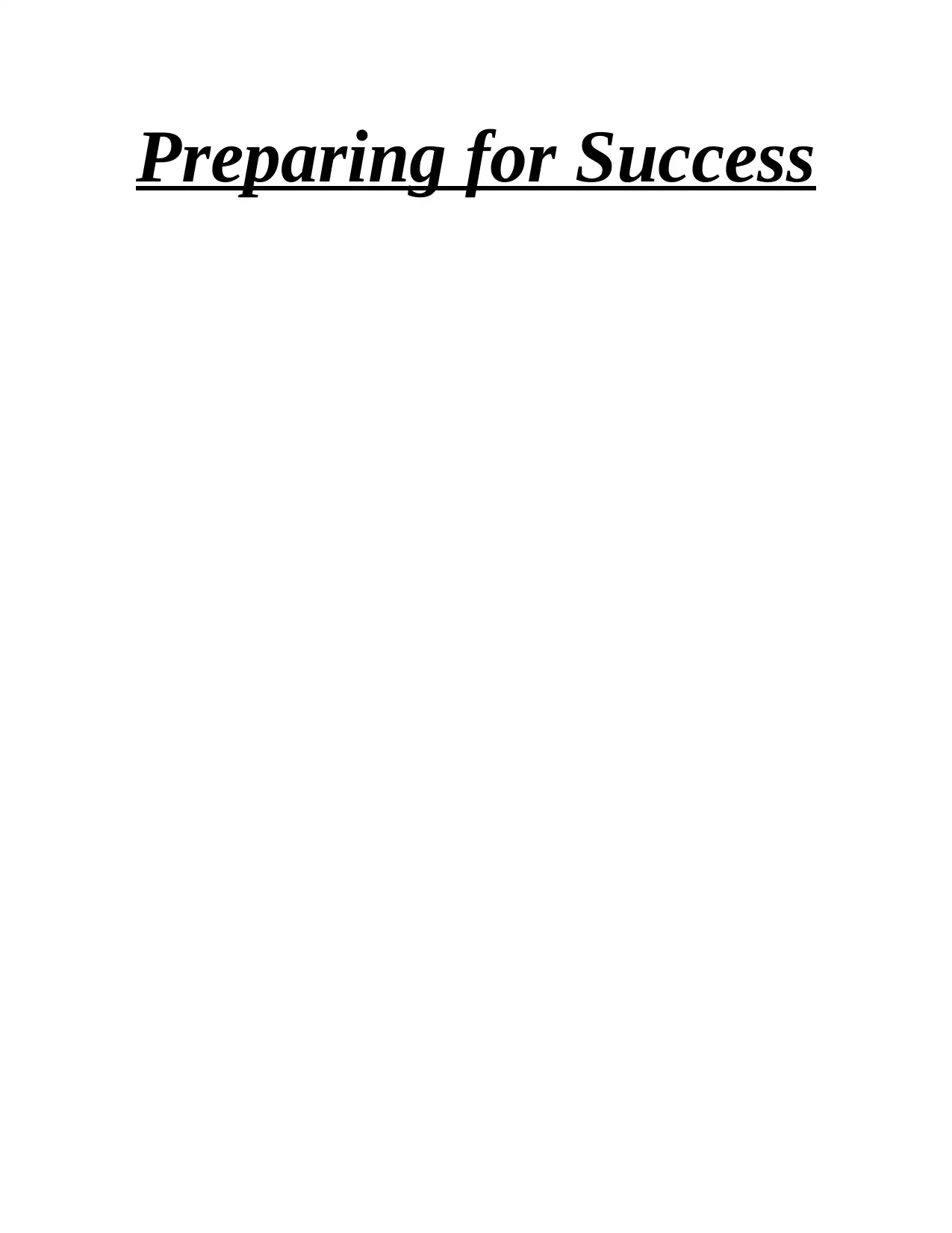
Preparing for Success
Paraphrase This Document
Need a fresh take? Get an instant paraphrase of this document with our AI Paraphraser
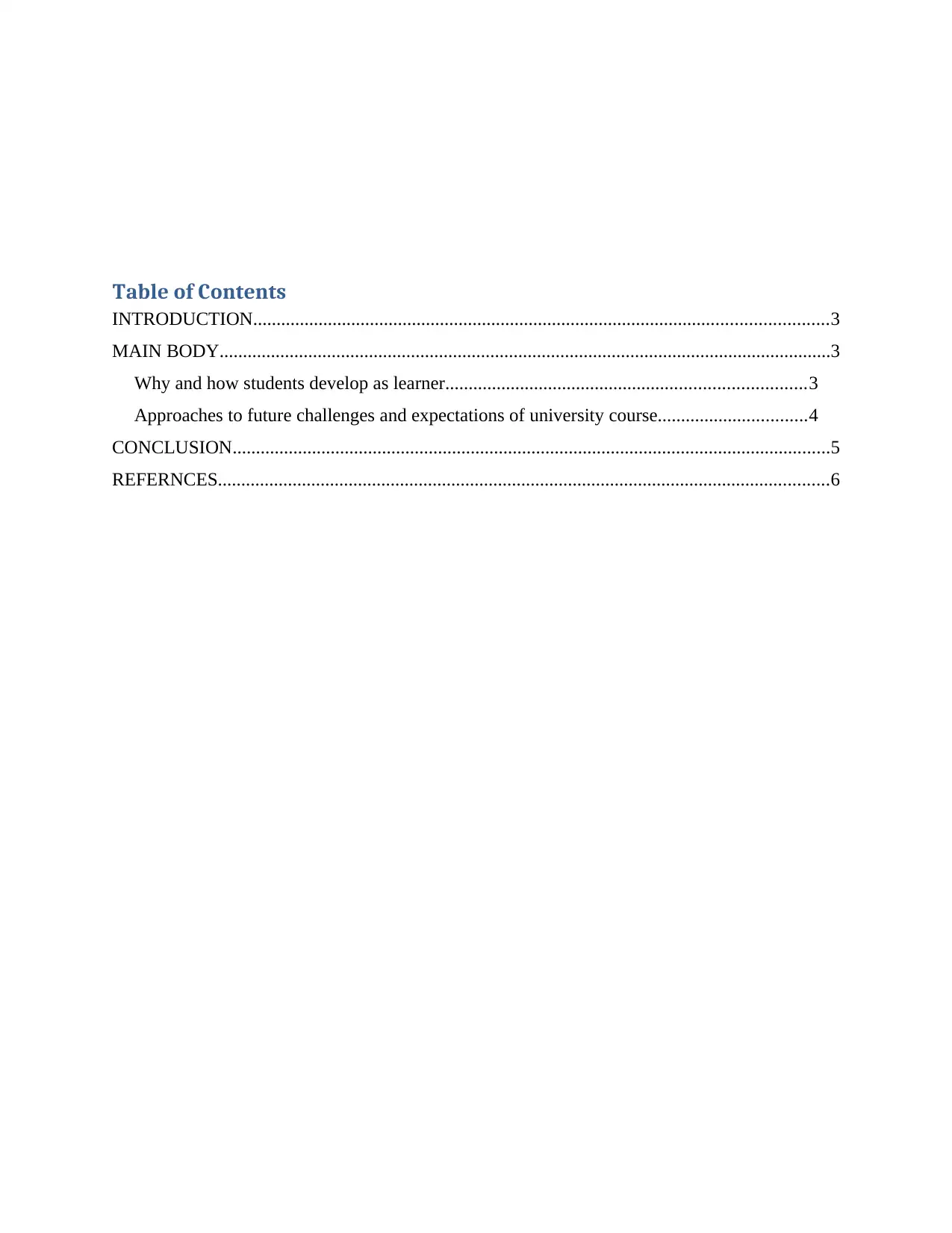
Table of Contents
INTRODUCTION...........................................................................................................................3
MAIN BODY...................................................................................................................................3
Why and how students develop as learner.............................................................................3
Approaches to future challenges and expectations of university course................................4
CONCLUSION................................................................................................................................5
REFERNCES...................................................................................................................................6
INTRODUCTION...........................................................................................................................3
MAIN BODY...................................................................................................................................3
Why and how students develop as learner.............................................................................3
Approaches to future challenges and expectations of university course................................4
CONCLUSION................................................................................................................................5
REFERNCES...................................................................................................................................6
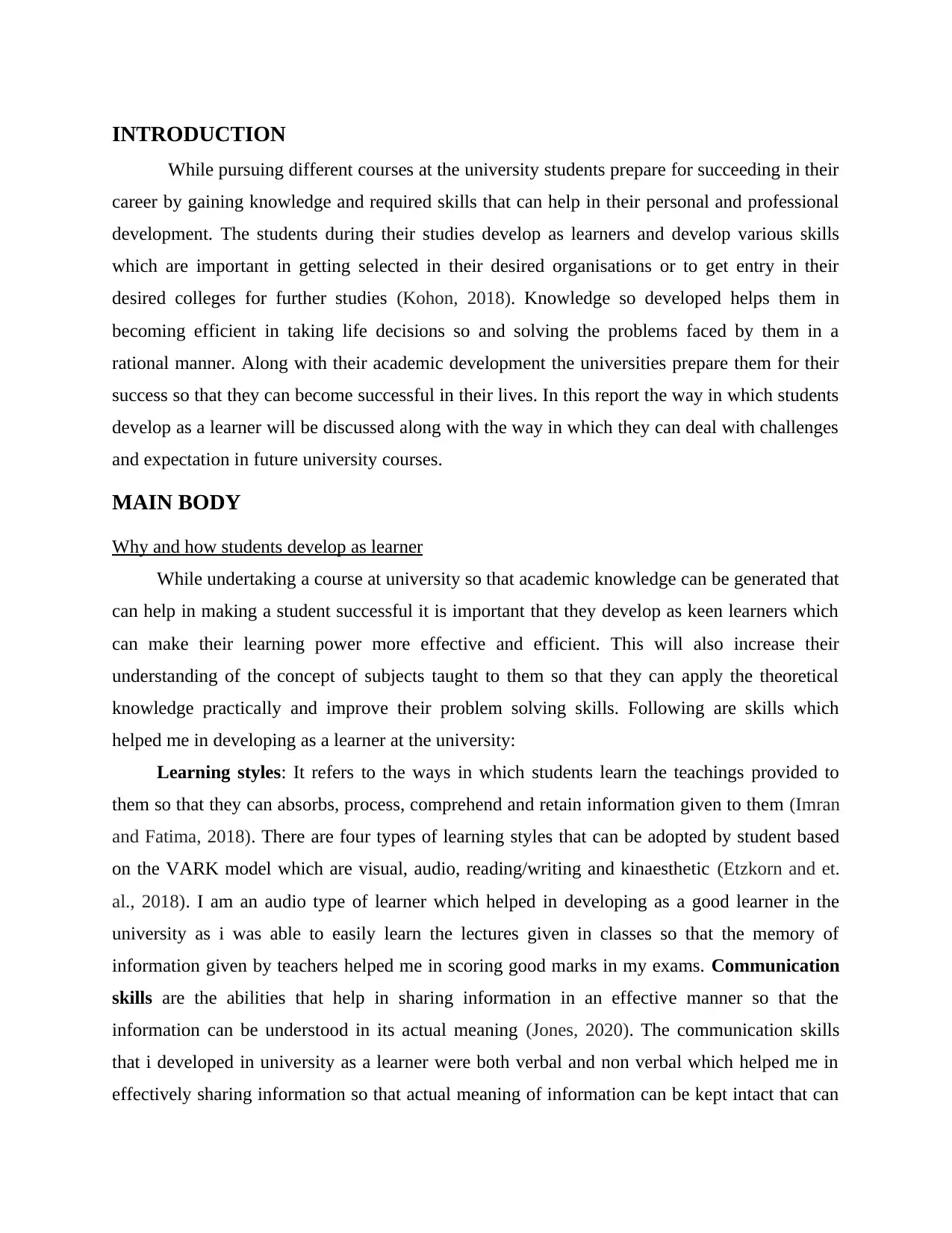
INTRODUCTION
While pursuing different courses at the university students prepare for succeeding in their
career by gaining knowledge and required skills that can help in their personal and professional
development. The students during their studies develop as learners and develop various skills
which are important in getting selected in their desired organisations or to get entry in their
desired colleges for further studies (Kohon, 2018). Knowledge so developed helps them in
becoming efficient in taking life decisions so and solving the problems faced by them in a
rational manner. Along with their academic development the universities prepare them for their
success so that they can become successful in their lives. In this report the way in which students
develop as a learner will be discussed along with the way in which they can deal with challenges
and expectation in future university courses.
MAIN BODY
Why and how students develop as learner
While undertaking a course at university so that academic knowledge can be generated that
can help in making a student successful it is important that they develop as keen learners which
can make their learning power more effective and efficient. This will also increase their
understanding of the concept of subjects taught to them so that they can apply the theoretical
knowledge practically and improve their problem solving skills. Following are skills which
helped me in developing as a learner at the university:
Learning styles: It refers to the ways in which students learn the teachings provided to
them so that they can absorbs, process, comprehend and retain information given to them (Imran
and Fatima, 2018). There are four types of learning styles that can be adopted by student based
on the VARK model which are visual, audio, reading/writing and kinaesthetic (Etzkorn and et.
al., 2018). I am an audio type of learner which helped in developing as a good learner in the
university as i was able to easily learn the lectures given in classes so that the memory of
information given by teachers helped me in scoring good marks in my exams. Communication
skills are the abilities that help in sharing information in an effective manner so that the
information can be understood in its actual meaning (Jones, 2020). The communication skills
that i developed in university as a learner were both verbal and non verbal which helped me in
effectively sharing information so that actual meaning of information can be kept intact that can
While pursuing different courses at the university students prepare for succeeding in their
career by gaining knowledge and required skills that can help in their personal and professional
development. The students during their studies develop as learners and develop various skills
which are important in getting selected in their desired organisations or to get entry in their
desired colleges for further studies (Kohon, 2018). Knowledge so developed helps them in
becoming efficient in taking life decisions so and solving the problems faced by them in a
rational manner. Along with their academic development the universities prepare them for their
success so that they can become successful in their lives. In this report the way in which students
develop as a learner will be discussed along with the way in which they can deal with challenges
and expectation in future university courses.
MAIN BODY
Why and how students develop as learner
While undertaking a course at university so that academic knowledge can be generated that
can help in making a student successful it is important that they develop as keen learners which
can make their learning power more effective and efficient. This will also increase their
understanding of the concept of subjects taught to them so that they can apply the theoretical
knowledge practically and improve their problem solving skills. Following are skills which
helped me in developing as a learner at the university:
Learning styles: It refers to the ways in which students learn the teachings provided to
them so that they can absorbs, process, comprehend and retain information given to them (Imran
and Fatima, 2018). There are four types of learning styles that can be adopted by student based
on the VARK model which are visual, audio, reading/writing and kinaesthetic (Etzkorn and et.
al., 2018). I am an audio type of learner which helped in developing as a good learner in the
university as i was able to easily learn the lectures given in classes so that the memory of
information given by teachers helped me in scoring good marks in my exams. Communication
skills are the abilities that help in sharing information in an effective manner so that the
information can be understood in its actual meaning (Jones, 2020). The communication skills
that i developed in university as a learner were both verbal and non verbal which helped me in
effectively sharing information so that actual meaning of information can be kept intact that can
⊘ This is a preview!⊘
Do you want full access?
Subscribe today to unlock all pages.

Trusted by 1+ million students worldwide
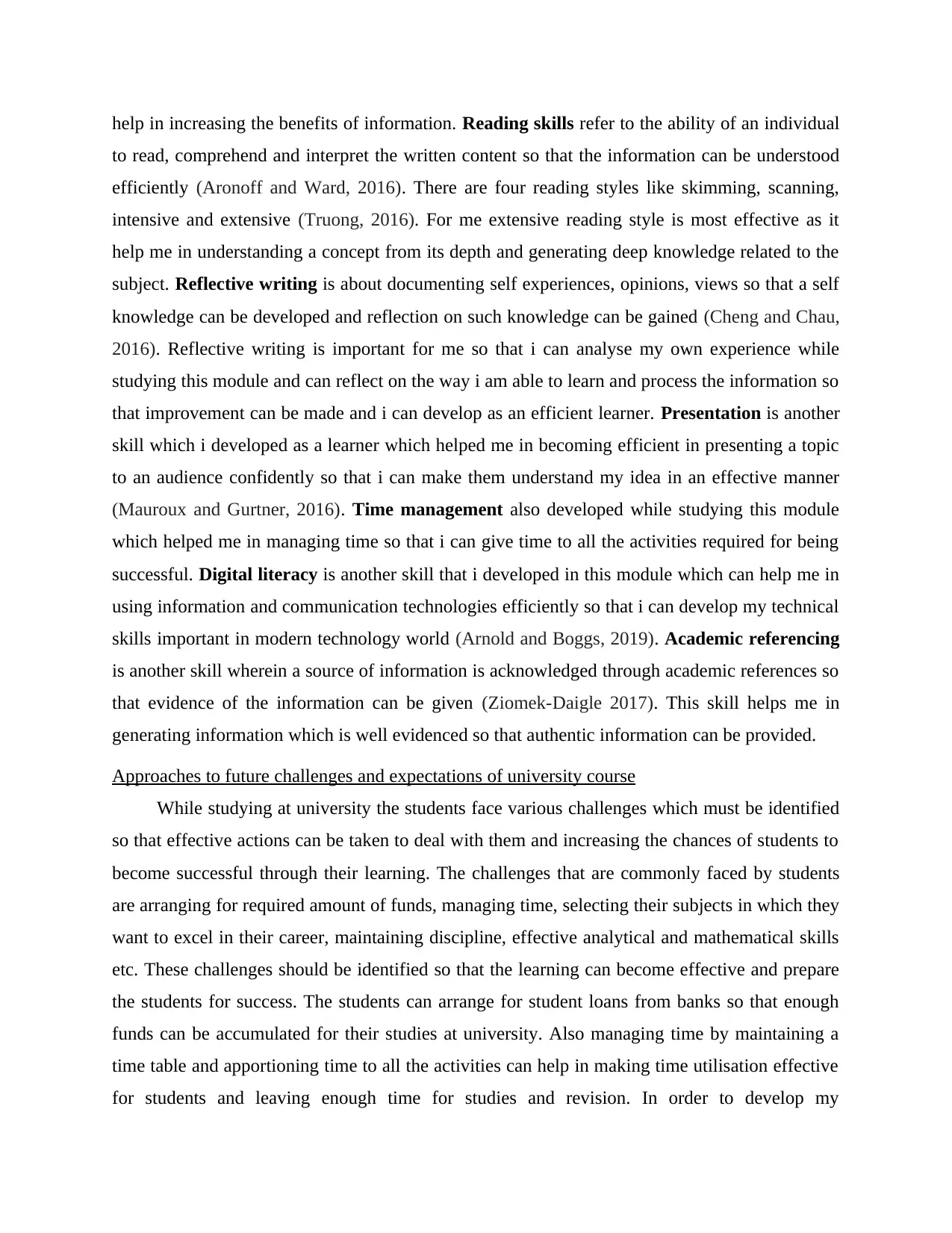
help in increasing the benefits of information. Reading skills refer to the ability of an individual
to read, comprehend and interpret the written content so that the information can be understood
efficiently (Aronoff and Ward, 2016). There are four reading styles like skimming, scanning,
intensive and extensive (Truong, 2016). For me extensive reading style is most effective as it
help me in understanding a concept from its depth and generating deep knowledge related to the
subject. Reflective writing is about documenting self experiences, opinions, views so that a self
knowledge can be developed and reflection on such knowledge can be gained (Cheng and Chau,
2016). Reflective writing is important for me so that i can analyse my own experience while
studying this module and can reflect on the way i am able to learn and process the information so
that improvement can be made and i can develop as an efficient learner. Presentation is another
skill which i developed as a learner which helped me in becoming efficient in presenting a topic
to an audience confidently so that i can make them understand my idea in an effective manner
(Mauroux and Gurtner, 2016). Time management also developed while studying this module
which helped me in managing time so that i can give time to all the activities required for being
successful. Digital literacy is another skill that i developed in this module which can help me in
using information and communication technologies efficiently so that i can develop my technical
skills important in modern technology world (Arnold and Boggs, 2019). Academic referencing
is another skill wherein a source of information is acknowledged through academic references so
that evidence of the information can be given (Ziomek-Daigle 2017). This skill helps me in
generating information which is well evidenced so that authentic information can be provided.
Approaches to future challenges and expectations of university course
While studying at university the students face various challenges which must be identified
so that effective actions can be taken to deal with them and increasing the chances of students to
become successful through their learning. The challenges that are commonly faced by students
are arranging for required amount of funds, managing time, selecting their subjects in which they
want to excel in their career, maintaining discipline, effective analytical and mathematical skills
etc. These challenges should be identified so that the learning can become effective and prepare
the students for success. The students can arrange for student loans from banks so that enough
funds can be accumulated for their studies at university. Also managing time by maintaining a
time table and apportioning time to all the activities can help in making time utilisation effective
for students and leaving enough time for studies and revision. In order to develop my
to read, comprehend and interpret the written content so that the information can be understood
efficiently (Aronoff and Ward, 2016). There are four reading styles like skimming, scanning,
intensive and extensive (Truong, 2016). For me extensive reading style is most effective as it
help me in understanding a concept from its depth and generating deep knowledge related to the
subject. Reflective writing is about documenting self experiences, opinions, views so that a self
knowledge can be developed and reflection on such knowledge can be gained (Cheng and Chau,
2016). Reflective writing is important for me so that i can analyse my own experience while
studying this module and can reflect on the way i am able to learn and process the information so
that improvement can be made and i can develop as an efficient learner. Presentation is another
skill which i developed as a learner which helped me in becoming efficient in presenting a topic
to an audience confidently so that i can make them understand my idea in an effective manner
(Mauroux and Gurtner, 2016). Time management also developed while studying this module
which helped me in managing time so that i can give time to all the activities required for being
successful. Digital literacy is another skill that i developed in this module which can help me in
using information and communication technologies efficiently so that i can develop my technical
skills important in modern technology world (Arnold and Boggs, 2019). Academic referencing
is another skill wherein a source of information is acknowledged through academic references so
that evidence of the information can be given (Ziomek-Daigle 2017). This skill helps me in
generating information which is well evidenced so that authentic information can be provided.
Approaches to future challenges and expectations of university course
While studying at university the students face various challenges which must be identified
so that effective actions can be taken to deal with them and increasing the chances of students to
become successful through their learning. The challenges that are commonly faced by students
are arranging for required amount of funds, managing time, selecting their subjects in which they
want to excel in their career, maintaining discipline, effective analytical and mathematical skills
etc. These challenges should be identified so that the learning can become effective and prepare
the students for success. The students can arrange for student loans from banks so that enough
funds can be accumulated for their studies at university. Also managing time by maintaining a
time table and apportioning time to all the activities can help in making time utilisation effective
for students and leaving enough time for studies and revision. In order to develop my
Paraphrase This Document
Need a fresh take? Get an instant paraphrase of this document with our AI Paraphraser
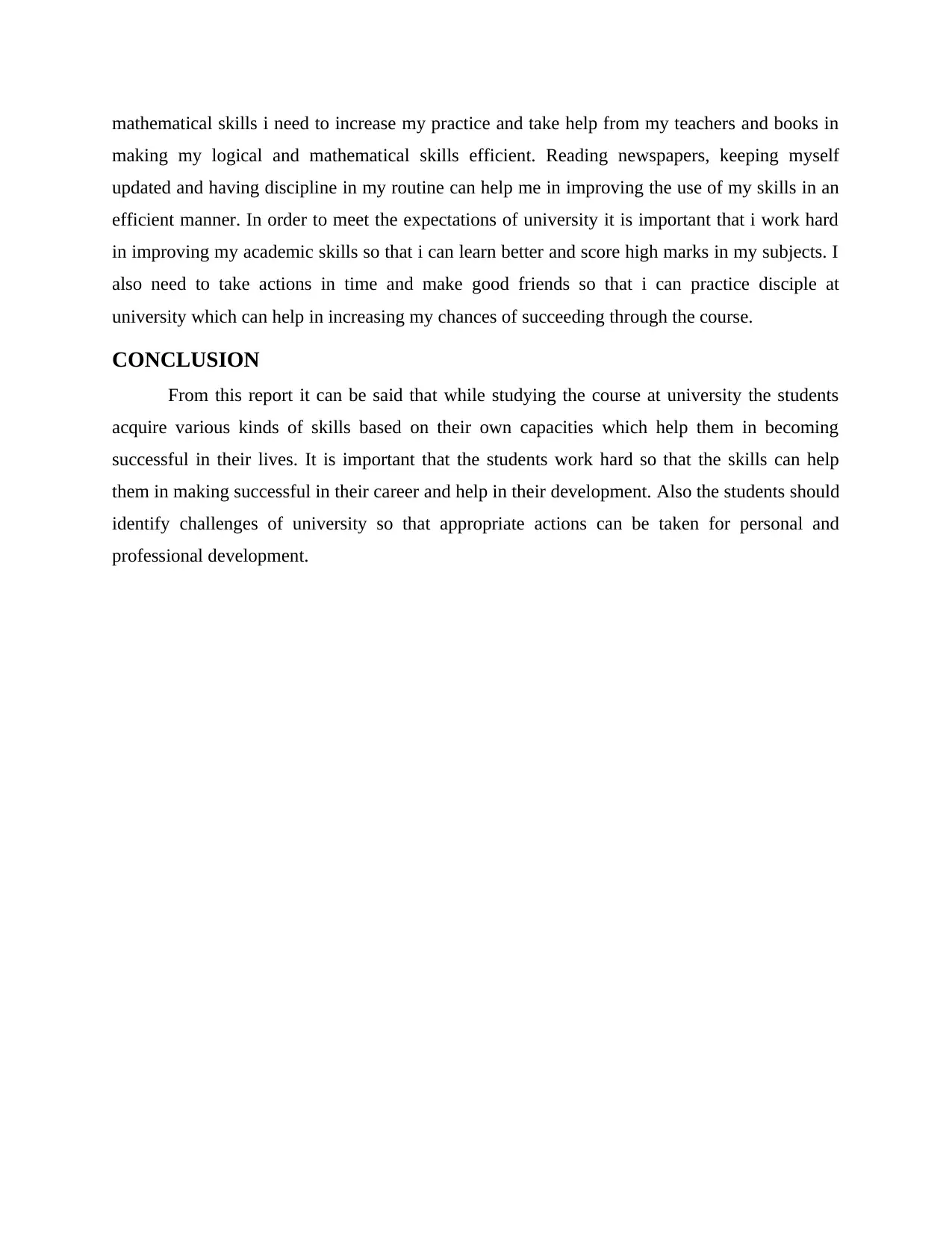
mathematical skills i need to increase my practice and take help from my teachers and books in
making my logical and mathematical skills efficient. Reading newspapers, keeping myself
updated and having discipline in my routine can help me in improving the use of my skills in an
efficient manner. In order to meet the expectations of university it is important that i work hard
in improving my academic skills so that i can learn better and score high marks in my subjects. I
also need to take actions in time and make good friends so that i can practice disciple at
university which can help in increasing my chances of succeeding through the course.
CONCLUSION
From this report it can be said that while studying the course at university the students
acquire various kinds of skills based on their own capacities which help them in becoming
successful in their lives. It is important that the students work hard so that the skills can help
them in making successful in their career and help in their development. Also the students should
identify challenges of university so that appropriate actions can be taken for personal and
professional development.
making my logical and mathematical skills efficient. Reading newspapers, keeping myself
updated and having discipline in my routine can help me in improving the use of my skills in an
efficient manner. In order to meet the expectations of university it is important that i work hard
in improving my academic skills so that i can learn better and score high marks in my subjects. I
also need to take actions in time and make good friends so that i can practice disciple at
university which can help in increasing my chances of succeeding through the course.
CONCLUSION
From this report it can be said that while studying the course at university the students
acquire various kinds of skills based on their own capacities which help them in becoming
successful in their lives. It is important that the students work hard so that the skills can help
them in making successful in their career and help in their development. Also the students should
identify challenges of university so that appropriate actions can be taken for personal and
professional development.
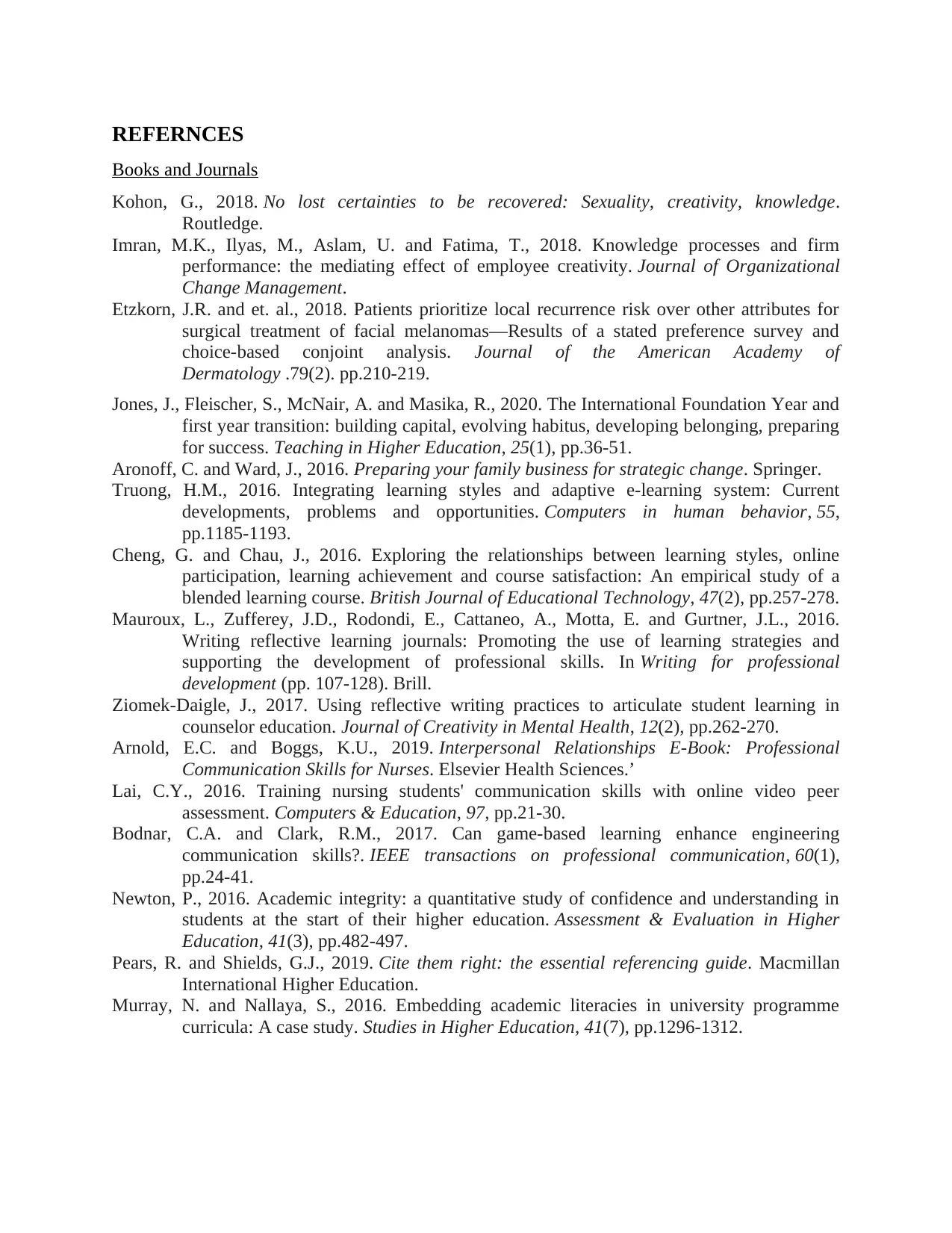
REFERNCES
Books and Journals
Kohon, G., 2018. No lost certainties to be recovered: Sexuality, creativity, knowledge.
Routledge.
Imran, M.K., Ilyas, M., Aslam, U. and Fatima, T., 2018. Knowledge processes and firm
performance: the mediating effect of employee creativity. Journal of Organizational
Change Management.
Etzkorn, J.R. and et. al., 2018. Patients prioritize local recurrence risk over other attributes for
surgical treatment of facial melanomas—Results of a stated preference survey and
choice-based conjoint analysis. Journal of the American Academy of
Dermatology .79(2). pp.210-219.
Jones, J., Fleischer, S., McNair, A. and Masika, R., 2020. The International Foundation Year and
first year transition: building capital, evolving habitus, developing belonging, preparing
for success. Teaching in Higher Education, 25(1), pp.36-51.
Aronoff, C. and Ward, J., 2016. Preparing your family business for strategic change. Springer.
Truong, H.M., 2016. Integrating learning styles and adaptive e-learning system: Current
developments, problems and opportunities. Computers in human behavior, 55,
pp.1185-1193.
Cheng, G. and Chau, J., 2016. Exploring the relationships between learning styles, online
participation, learning achievement and course satisfaction: An empirical study of a
blended learning course. British Journal of Educational Technology, 47(2), pp.257-278.
Mauroux, L., Zufferey, J.D., Rodondi, E., Cattaneo, A., Motta, E. and Gurtner, J.L., 2016.
Writing reflective learning journals: Promoting the use of learning strategies and
supporting the development of professional skills. In Writing for professional
development (pp. 107-128). Brill.
Ziomek-Daigle, J., 2017. Using reflective writing practices to articulate student learning in
counselor education. Journal of Creativity in Mental Health, 12(2), pp.262-270.
Arnold, E.C. and Boggs, K.U., 2019. Interpersonal Relationships E-Book: Professional
Communication Skills for Nurses. Elsevier Health Sciences.’
Lai, C.Y., 2016. Training nursing students' communication skills with online video peer
assessment. Computers & Education, 97, pp.21-30.
Bodnar, C.A. and Clark, R.M., 2017. Can game-based learning enhance engineering
communication skills?. IEEE transactions on professional communication, 60(1),
pp.24-41.
Newton, P., 2016. Academic integrity: a quantitative study of confidence and understanding in
students at the start of their higher education. Assessment & Evaluation in Higher
Education, 41(3), pp.482-497.
Pears, R. and Shields, G.J., 2019. Cite them right: the essential referencing guide. Macmillan
International Higher Education.
Murray, N. and Nallaya, S., 2016. Embedding academic literacies in university programme
curricula: A case study. Studies in Higher Education, 41(7), pp.1296-1312.
Books and Journals
Kohon, G., 2018. No lost certainties to be recovered: Sexuality, creativity, knowledge.
Routledge.
Imran, M.K., Ilyas, M., Aslam, U. and Fatima, T., 2018. Knowledge processes and firm
performance: the mediating effect of employee creativity. Journal of Organizational
Change Management.
Etzkorn, J.R. and et. al., 2018. Patients prioritize local recurrence risk over other attributes for
surgical treatment of facial melanomas—Results of a stated preference survey and
choice-based conjoint analysis. Journal of the American Academy of
Dermatology .79(2). pp.210-219.
Jones, J., Fleischer, S., McNair, A. and Masika, R., 2020. The International Foundation Year and
first year transition: building capital, evolving habitus, developing belonging, preparing
for success. Teaching in Higher Education, 25(1), pp.36-51.
Aronoff, C. and Ward, J., 2016. Preparing your family business for strategic change. Springer.
Truong, H.M., 2016. Integrating learning styles and adaptive e-learning system: Current
developments, problems and opportunities. Computers in human behavior, 55,
pp.1185-1193.
Cheng, G. and Chau, J., 2016. Exploring the relationships between learning styles, online
participation, learning achievement and course satisfaction: An empirical study of a
blended learning course. British Journal of Educational Technology, 47(2), pp.257-278.
Mauroux, L., Zufferey, J.D., Rodondi, E., Cattaneo, A., Motta, E. and Gurtner, J.L., 2016.
Writing reflective learning journals: Promoting the use of learning strategies and
supporting the development of professional skills. In Writing for professional
development (pp. 107-128). Brill.
Ziomek-Daigle, J., 2017. Using reflective writing practices to articulate student learning in
counselor education. Journal of Creativity in Mental Health, 12(2), pp.262-270.
Arnold, E.C. and Boggs, K.U., 2019. Interpersonal Relationships E-Book: Professional
Communication Skills for Nurses. Elsevier Health Sciences.’
Lai, C.Y., 2016. Training nursing students' communication skills with online video peer
assessment. Computers & Education, 97, pp.21-30.
Bodnar, C.A. and Clark, R.M., 2017. Can game-based learning enhance engineering
communication skills?. IEEE transactions on professional communication, 60(1),
pp.24-41.
Newton, P., 2016. Academic integrity: a quantitative study of confidence and understanding in
students at the start of their higher education. Assessment & Evaluation in Higher
Education, 41(3), pp.482-497.
Pears, R. and Shields, G.J., 2019. Cite them right: the essential referencing guide. Macmillan
International Higher Education.
Murray, N. and Nallaya, S., 2016. Embedding academic literacies in university programme
curricula: A case study. Studies in Higher Education, 41(7), pp.1296-1312.
⊘ This is a preview!⊘
Do you want full access?
Subscribe today to unlock all pages.

Trusted by 1+ million students worldwide
1 out of 6
Related Documents
Your All-in-One AI-Powered Toolkit for Academic Success.
+13062052269
info@desklib.com
Available 24*7 on WhatsApp / Email
![[object Object]](/_next/static/media/star-bottom.7253800d.svg)
Unlock your academic potential
Copyright © 2020–2026 A2Z Services. All Rights Reserved. Developed and managed by ZUCOL.





